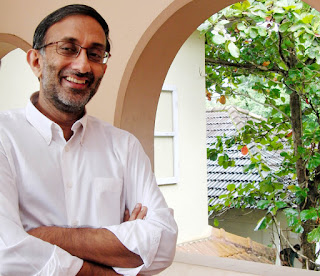Rebuilding broken minds
Human mind is intricate and hence the risks involved in the treatment of deranged minds. But with just a dozen medicines and help from a systematic cure method, a psychiatrist is making a stride in the field of community psychiatry in the tiny southern state of India.
Dr T Manoj Kumar, who has worked in Britain for 20 years, returned to his homeland with a mission of extending his expertise in community psychiatry to the marginalised section of the society free of cost.
Speaking to The Gulf Today, the Indian-educated doctor, who has visited Dubai in his attempt to widen a network of service-minded people in his voluntary work, said he is dealing with people in the working age adult group who have lost their mental abilities to perform productively and carry on with their lives without others’ help.
Three years ago, he joined the Institute of Palliative Medicine, a registered charitable organisation functioning in Kozhikode, a town known for its humanitarian activities in Kerala. He started his practice under the banner of Mehac Foundation to treat the mentally unstable until Mental Health Action Trust (MHAT) was formed on Jan. 1, 2010.
Solely depending on voluntary contributions from individuals, MHAT has a network of social workers and community members who help Manoj in his endeavour to reach out to the needy and poor. This set of service-minded volunteers who “wish nothing,” but the well-being of patients, is the backbone of the clinics run by MHAT. These volunteers locate those in need of psychiatric treatment and ensure they belong to the economically backward section of the society before bringing them to the clinics.
In a short span of his service in Kerala, Dr Manoj has found that psychotic disorders among the marginalised section are intertwined with deprived living conditions. He also drew attention to the tendency among the rich “to get rid of mental patients at any cost” to save the name and fame of the family. Rejecting the idea of equality in treatment, the doctor said, “When doctors and medical facilities are easily available to the rich, why should I bother about them?”
According to the doctor, the vastness of science does not enable doctors to deal with all the problems. “Especially in the field of psychiatry, medicines alone won’t help in curing the illness completely. There are various myths surrounding it which need to be eradicated first. We keep a record of all the patients online and activities of all the 30 community clinics are linked too so that volunteers as well as doctors could offer medication at any time.
“There is no difference between a mentally challenged person in the UK or Kerala. The difference lies just with the mooring points like culture, traditional beliefs, tastes etc. The functioning of human mind and body are the same everywhere. So it is not difficult to treat the patients anywhere. Of course, the years I have spent in the UK have helped me in co-ordinating my efforts here. The best thing I have noticed in the UK is the systematic approach in healthcare system.”
The doctor said the reasons for mental disorders are not just triggered by neuro-chemical imbalance of the brain. And he rubbishes popular beliefs like “shocked by something” or “mental shocks” as reasons for someone showing mental illness. When science falls short of explaining the real reason for mental disorder, Dr Manoj says, first-degree relatives can make a difference in the whole issue.
But that does not mean the doctor calls for awareness campaigns. His mode of functioning is different from the conventional mental health institutions and so rejects the idea of collaborating with the government sector to reach out to more people.
“We don’t believe in numbers of beds or medicines. I am using just a dozen medicines. What is more important in community psychiatry is participation from the community a patient belongs to.
“If you say government collaboration will help to get more professional doctors, they too are facing the same problem. According to me, a qualified doctor who can be trained in community psychiatry is enough to treat the mental patients. I admit there is a question of legality in it. But to yield better results, sometimes one has to adopt risky methods. I think things will change for better across the country with the postgraduate programme MA Social Work in Mental Health offered by Tata Institute of Social Sciences.”
The doctor nurtures hopes of establishing an Institute for Mental Health, first of its kind in India, for training, teaching and research activities in community mental health programme to eradicate social stigma on people with mental illness.
http://www.gulftoday.ae/portal/eb70c266-9e3c-4462-afe3-c765f33b4497.aspx



Comments
Post a Comment